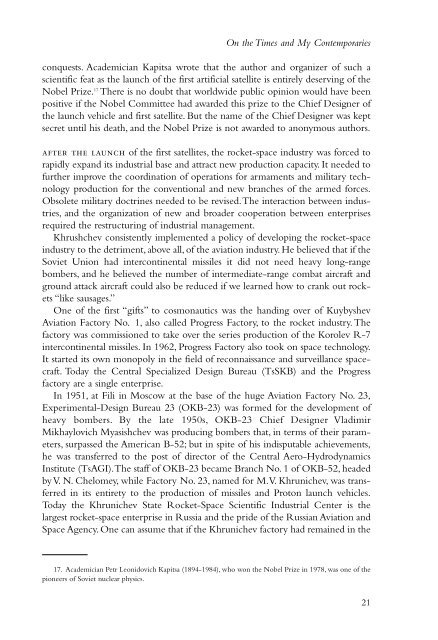- Page 1 and 2: Chapter 1 Introduction: A Debt to M
- Page 3 and 4: machine, acting as an absolutely ne
- Page 5 and 6: Chapter 2 On the Times and My Conte
- Page 7 and 8: On the Times and My Contemporaries
- Page 9 and 10: On the Times and My Contemporaries
- Page 11 and 12: On the Times and My Contemporaries
- Page 13 and 14: On the Times and My Contemporaries
- Page 15 and 16: On the Times and My Contemporaries
- Page 17 and 18: On the Times and My Contemporaries
- Page 19: On the Times and My Contemporaries
- Page 23 and 24: On the Times and My Contemporaries
- Page 25 and 26: On the Times and My Contemporaries
- Page 27 and 28: On the Times and My Contemporaries
- Page 29 and 30: Chapter 3 Between Two Aerodromes Al
- Page 31 and 32: From the author’s archives. The a
- Page 33 and 34: Between Two Aerodromes “our side.
- Page 35 and 36: Between Two Aerodromes A line had a
- Page 37 and 38: Between Two Aerodromes Soon my know
- Page 39: Between Two Aerodromes the second t
- Page 42 and 43: Rockets and People I showed no zeal
- Page 44 and 45: Rockets and People The physics teac
- Page 46 and 47: Rockets and People in detail in his
- Page 48 and 49: Rockets and People cruiser Oktyabrs
- Page 50 and 51: Rockets and People When we gathered
- Page 52 and 53: Rockets and People for Everyone. Sh
- Page 54 and 55: Rockets and People technical instit
- Page 57 and 58: Chapter 5 Factory No. 22 I worked a
- Page 59 and 60: Factory No. 22 The famous flight to
- Page 61 and 62: Factory No. 22 Third, and finally,
- Page 63 and 64: Factory No. 22 At a lecture for the
- Page 65 and 66: ZIKh museum archives. Sergey Petrov
- Page 67 and 68: Factory No. 22 and factory flight t
- Page 69 and 70: Factory No. 22 many orders and hono
- Page 71 and 72:
Factory No. 22 lem on a historical
- Page 73 and 74:
Factory No. 22 showcase people who
- Page 75 and 76:
Factory No. 22 signed by Stalin.The
- Page 77 and 78:
Factory No. 22 to assemble and make
- Page 79 and 80:
Factory No. 22 the pilot to take of
- Page 81 and 82:
Factory No. 22 One of the severe me
- Page 83 and 84:
Factory No. 22 lived in a new gover
- Page 85 and 86:
Factory No. 22 forgot the number. A
- Page 87 and 88:
Factory No. 22 parents what had hap
- Page 89 and 90:
From the author’s archives. The a
- Page 91 and 92:
Factory No. 22 team.We were faced w
- Page 93 and 94:
Factory No. 22 to be able to critic
- Page 95 and 96:
Factory No. 22 In spite of my lack
- Page 97 and 98:
Factory No. 22 was removed from the
- Page 99 and 100:
Chapter 6 In the Bolkhovitinov Desi
- Page 101 and 102:
In the Bolkhovitinov Design Bureau
- Page 103 and 104:
In the Bolkhovitinov Design Bureau
- Page 105 and 106:
In the Bolkhovitinov Design Bureau
- Page 107 and 108:
In the Bolkhovitinov Design Bureau
- Page 109 and 110:
In the Bolkhovitinov Design Bureau
- Page 111 and 112:
In the Bolkhovitinov Design Bureau
- Page 113 and 114:
In the Bolkhovitinov Design Bureau
- Page 115:
In the Bolkhovitinov Design Bureau
- Page 118 and 119:
Rockets and People The Main Directo
- Page 120 and 121:
Rockets and People Levanevskiy and
- Page 122 and 123:
Rockets and People And this was how
- Page 124 and 125:
Rockets and People On 18 June 1937,
- Page 126 and 127:
Rockets and People As the aircraft
- Page 128 and 129:
Rockets and People Nikolay Nikolaye
- Page 130 and 131:
Rockets and People Godovikov, Frolo
- Page 132 and 133:
Rockets and People “Good bye and
- Page 134 and 135:
Rockets and People reported the rec
- Page 136 and 137:
Rockets and People United States an
- Page 138 and 139:
Rockets and People with the support
- Page 140 and 141:
Rockets and People tion in avionics
- Page 142 and 143:
Rockets and People evening devoted
- Page 144 and 145:
Rockets and People guished himself
- Page 147 and 148:
Chapter 9 Return to Bolkhovitinov I
- Page 149 and 150:
Return to Bolkhovitinov would be pr
- Page 151 and 152:
Return to Bolkhovitinov Having subm
- Page 153 and 154:
Return to Bolkhovitinov the long to
- Page 155:
Return to Bolkhovitinov semi-satiri
- Page 158 and 159:
Rockets and People The Germans were
- Page 160 and 161:
Rockets and People design bureaus a
- Page 162 and 163:
Rockets and People ance systems for
- Page 164 and 165:
Rockets and People Bolkhovitinov ad
- Page 166 and 167:
Rockets and People NASA History Off
- Page 168 and 169:
Rockets and People lagged behind us
- Page 170 and 171:
Rockets and People those who knew t
- Page 172 and 173:
Rockets and People with a violent b
- Page 174 and 175:
Rockets and People of free space in
- Page 176 and 177:
Rockets and People voir banks and c
- Page 178 and 179:
Rockets and People On 1 September,
- Page 180 and 181:
Rockets and People From the author
- Page 182 and 183:
Rockets and People Golubkin family,
- Page 184 and 185:
Rockets and People Moscow has stopp
- Page 186 and 187:
Rockets and People included in a te
- Page 188 and 189:
Rockets and People Working together
- Page 190 and 191:
Rockets and People great difficulty
- Page 192 and 193:
Rockets and People asm.The notion o
- Page 194 and 195:
Rockets and People cockpit after th
- Page 196 and 197:
Rockets and People A day later ther
- Page 198 and 199:
Rockets and People Bakhchivandzhi d
- Page 201 and 202:
Chapter 14 Back in Moscow In the su
- Page 203 and 204:
Back in Moscow which consisted of a
- Page 205 and 206:
Back in Moscow experience. RNII has
- Page 207 and 208:
Back in Moscow an order was issued
- Page 209:
Back in Moscow subordinates—becam
- Page 212 and 213:
Rockets and People guidance special
- Page 214 and 215:
Rockets and People This group consi
- Page 216 and 217:
Rockets and People From the author
- Page 218 and 219:
Rockets and People being developed
- Page 220 and 221:
Rockets and People comfortable hote
- Page 222 and 223:
Rockets and People With no further
- Page 224 and 225:
Rockets and People From the author
- Page 226 and 227:
Rockets and People we sensed someth
- Page 228 and 229:
Rockets and People We had ended up
- Page 230 and 231:
Rockets and People women who had be
- Page 232 and 233:
Rockets and People 232 According to
- Page 234 and 235:
Rockets and People Yes, these were
- Page 236 and 237:
Rockets and People At that time in
- Page 238 and 239:
Rockets and People try there was on
- Page 240 and 241:
Rockets and People “portable” g
- Page 242 and 243:
Rockets and People I need to write
- Page 244 and 245:
Rockets and People For the first ti
- Page 246 and 247:
Rockets and People The infantry com
- Page 248 and 249:
Rockets and People even frightening
- Page 250 and 251:
Rockets and People In addition, and
- Page 252 and 253:
Rockets and People defense fighters
- Page 254 and 255:
Rockets and People The first meetin
- Page 256 and 257:
Rockets and People use as a weapon.
- Page 258 and 259:
Rockets and People north-northeast
- Page 260 and 261:
Rockets and People battle. Included
- Page 262 and 263:
Rockets and People to fires in the
- Page 264 and 265:
Rockets and People The title of the
- Page 266 and 267:
Rockets and People In modern-day Ge
- Page 268 and 269:
Rockets and People on the BI-1, the
- Page 271 and 272:
Chapter 18 To Thuringia The Allied
- Page 273 and 274:
To Thuringia life? Our developers n
- Page 275 and 276:
To Thuringia leather breeches, and
- Page 277 and 278:
Chapter 19 Nordhausen—City of Mis
- Page 279 and 280:
Nordhausen—City of Missiles and D
- Page 281 and 282:
Nordhausen—City of Missiles and D
- Page 283 and 284:
Nordhausen—City of Missiles and D
- Page 285 and 286:
Nordhausen—City of Missiles and D
- Page 287 and 288:
Chapter 20 Birth of the Institute R
- Page 289 and 290:
Birth of the Institute RABE From th
- Page 291 and 292:
Birth of the Institute RABE We were
- Page 293 and 294:
Birth of the Institute RABE Every d
- Page 295 and 296:
Birth of the Institute RABE From th
- Page 297 and 298:
Birth of the Institute RABE sentati
- Page 299 and 300:
Chapter 21 Operation “Ost” Ther
- Page 301 and 302:
Operation “Ost” dant to serve t
- Page 303 and 304:
Operation “Ost” or another Sovi
- Page 305 and 306:
Operation “Ost” for a long time
- Page 307:
Operation “Ost” Peenemünde pro
- Page 310 and 311:
Rockets and People high-ranking off
- Page 312 and 313:
Rockets and People from the “fore
- Page 314 and 315:
Rockets and People among the occupa
- Page 316 and 317:
Rockets and People torship. His wif
- Page 319 and 320:
Chapter 23 In Search of a Real Boss
- Page 321 and 322:
From the author’s archives. Lev M
- Page 323:
In Search of a Real Boss Commissari
- Page 326 and 327:
Rockets and People Pobedonostsev kn
- Page 328 and 329:
Rockets and People knew all about K
- Page 330 and 331:
Rockets and People Behind him were
- Page 332 and 333:
Rockets and People German prisoner
- Page 334 and 335:
Rockets and People from a height of
- Page 336 and 337:
Rockets and People attempt to escap
- Page 338 and 339:
Rockets and People The Germans had
- Page 340 and 341:
Rockets and People Our engine speci
- Page 342 and 343:
Rockets and People higher specific
















